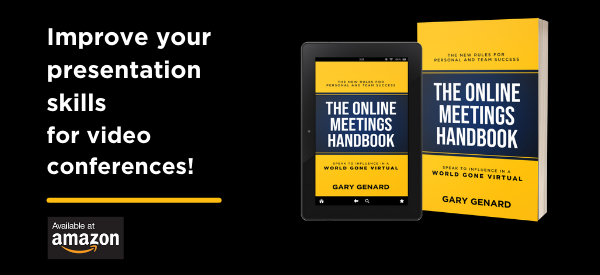
Do you go blank from public speaking anxiety? If you experience social anxiety and the phobia known as stage fright, here are four solutions for you!
We all experience speaking nervousness to some extent. For some speakers, it reaches the level of anxiety, and even a phobia of speaking or outright panic attacks. Perhaps not surprisingly, this occurs in today's virtual communication as it always has in live presentations.
Today's all-virtual-speaking-all-the-time won't last, of course. We'll get back to in-person meetings, conferences, sales pitches, and all the rest. Likewise, the problem of nerves or anxiety over speaking in public won't go away.
Want to be a more dynamic virtual speaker? Improve your video presentations! Get my new book—the manual for individuals and teams, The Online Meetings Handbook.
Over the last 20 years at The Genard Method, I’ve coached professionals from all over the world in how to overcome speech anxiety. It's without doubt a major problem among some speakers, and can even become the greatest challenge they face in their career.
Discover a powerful tool for serenity and focus, even if you have just 5 minutes to spare! Download my free cheat sheet, "How to Calm Your Nerves Before Speaking."
Going Blank When You Need to Be at Your Best
For some people, the moment of truth comes right at the start of their speech. Looking out at the audience, they suddenly go blank. However knowledgeable they are about their topic, and despite sufficient preparation and practice, it all seems to fly out the window when they stand before an audience.
Want to hold any audience in the palm of your hand? Get my Free resource, "How to Start a Speech — 12 Foolproof Ways to Grab Your Audience!
Interestingly, the phenomenon of going blank isn’t limited to people with full-blown speech anxiety. We’ve all experienced it, whether from nerves, lack of focus, or even over-preparing. I remember opening the blank blue book at my last final exam as an undergraduate. I’d stayed up most of the night studying, and I experienced a moment of panic as I thought, “I don’t remember anything!”
Fortunately, my moment of loss caused by sheer mental exhaustion passed, as it does for most speakers. But if you're that presenter, what do you do in the meantime? How do you recover and go on, preferably without alerting the audience that you’ve gone blank at all? Below are four prescriptions if an acute attack of The Blanks occurs while you're talking . . . or just before you're about to speak.

Rx #1: Relate to Your Listeners More than to Content
As in most crisis situations, the best defense involves preparing sufficiently beforehand. But many speakers don’t do this. In fact, their preparation actually makes things difficult for themselves in terms of being comfortable in front of an audience.
It’s a frequent discussion I have with clients who are having difficulty relating to their team, a board, or the large audiences of keynotes or media appearances. When I ask how they prepare for their talks, these speakers say they go over their notes again and again, trying to make sure they don’t miss a single important point.
But do you see how that’s misguided preparation? The chances are almost certain that these professionals are solid where their content is concerned. After all, that content is usually the subject matter they deal with day in and day out, sometimes for years. Their performance skills, on the other hand—which is the area that as an actor I specialize in with clients—are probably not up to that level by a long shot.
Discover how leaders succeed! Download my Free cheat sheet, "Leadership Skills: The 5 Essential Speaking Techniques."
To win in the public speaking arena, you have to be comfortable standing in front of an audience and relating to those listeners. So it’s the relationship you have with them that matters most!
Remind yourself beforehand of exactly who you'll be speaking to; what their needs are; and how you can help meet those needs by speaking to them. If you do go blank, you only need to remind yourself—very quickly—of what your purpose is in your presentation. Circle back to that purpose, and what you need to say to them right now will again be clear to you.
Rx #2: Trust Your Audience, But Most of All, Yourself
Fortunately, your brain works very fast—especially at moments of crisis. Like your relationship with listeners, you can rely on that ability at the moment when you need it most.
All of us have moments when we forget what we want to say—when the thought of a few seconds ago just slips away. You may recover it again the next second; or it might be gone for good.
No matter. Your speech or presentation probably won’t be diminished in the least because of that moment. Why? First, your audience has no idea what you intended to say. Even more important: whatever you do say will be appropriate for that moment in your talk.
That’s because you have a deep reservoir of knowledge of your topic at your disposal every minute you speak. You need only stay in the moment and draw upon it. In other words: you simply need to trust that you’ll say something appropriate and purposeful as you recover from going blank. It will happen because of your experience and professionalism. So trust yourself. Your abilities are the reason why you've been handed this assignment in the first place.

Rx #3: Ask Yourself: “What’s the Need Here?”
Use this prescription when you’re facing the highest of those blank walls, when nothing seems to come. A physician client of mine experienced this frequently. He’d prepare studiously, look out at his audience of fellow physicians . . . and wonder where his talk had flown away to.
No matter that he was armed with a carefully prepared PowerPoint deck. Speaking intelligently on each slide seemed to be a task wholly beyond his skill at the moment.
So I suggested that he ask himself this question: "What's the need here?" In his case—in yours too!—there was a highly specific reason he was speaking. His audience of doctors practiced other specialties; and when they worked as a team, they needed to know some of the things he was expert in but they weren’t. Their need, you see, was practical and transparent.
Reminding yourself of the need of your audience—the justification of why you’re speaking—will get you back on the right wavelength. That is to say, the audience’s wavelength. Speak to that need in the very next thing you say. It may seem like a baby-step to you, but it will be a step in the right direction. As to whether the rest of what you need to say will come freely to you, see prescription #2 above.
Rx #4: Point Yourself in the Right Direction
My last prescription for dealing with going blank at the start of your talks is more fundamental and basic than the three above. Rather than a strategy, it involves getting yourself in the right mindset. And that mindset has to do with turning your focus around as a speaker.
As presenters, we’re too often guilty of being speaker-centric rather than audience-centric. After all, we feel, it’s our emotions and goals that are on the line. And of course, we're the ones standing (or these days sitting) in the spotlight.
But that’s not really why we’re there. The point of any speech isn’t to satisfy the speaker, but the listeners. So the moment we get wrapped up in our own responses, we’re facing the wrong way.
It may be that you have an actual fear of public speaking; or it may just be anxiety over doing well. It might even be plain nervousness. Whatever the decibel level of your self-regard, it keeps your energy and focus flowing toward yourself, rather than in the right direction.
If stage fright or a public speaking phobia is holding you back professionally, take a look at my live 1:1 online coaching program, The Fearless Speaking Course.
Getting help fast. Finally, if you go blank, you need to get help quickly. Fortunately, it's right in front of you. It's your audience itself.
Relating to the people you're talking to will bring you back into the present. Look at them, and notice their expressions and behavior. There might be something there you can use. “You all look excited—that’s great, because I know you’re going to love the features of this new software.” If you’re completely blank, ask a question to get the ball rolling and to give you time to recover. I've used that tactic many times myself when the knowledge of my training audience exceeds my own concerning a topic in their industry.
Though you didn't plan that response in advance, it can be just the medicine you need at this instant. You’d be amazed at how quickly it stimulates the juices to flow.
This article was published previously. It is updated here.
You should follow me on Twitter here. And click on the image below for my new book!
Gary Genard is an actor, author, and expert in public speaking training and overcoming speaking fear. His company, Boston-based The Genard Method offers live 1:1 Zoom executive coaching worldwide. In 2020 for the seventh consecutive year, Gary has been ranked by Global Gurus as One of The World's Top 30 Communication Professionals. He is the author of How to Give a Speech. His second book, Fearless Speaking, was named in 2019 as "One of the 100 Best Confidence Books of All Time." His latest book is The Online Meetings Handbook, now available on Amazon. Contact Gary here.



